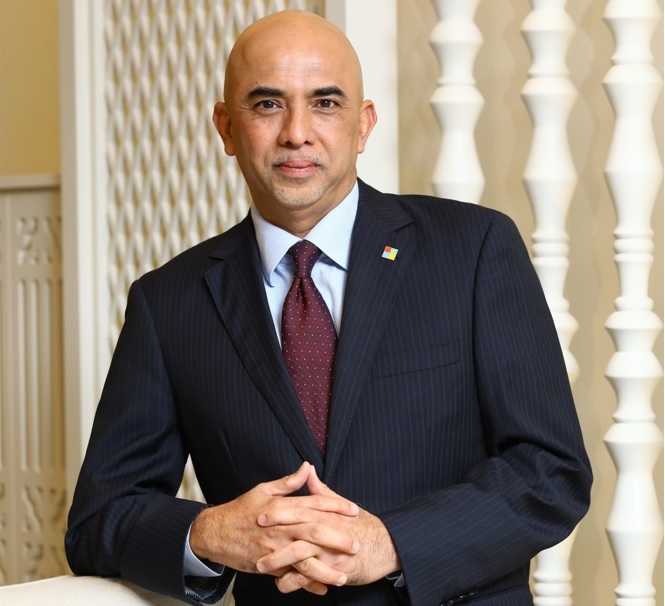Empowering A Secure Digital Experience Through Diverse Efforts
By Digital News Asia April 28, 2022
- 20,000 cybersecurity professionals needed in Malaysia by 2025
- Panel on Women in Cybersecurity spotlights opportunities for grads
.jpg)
The overall trend of female participation in the world of tech paints a grim picture. According to a US-based non-profit organisation, Girls Who Code, research shows that in 1995, 37% of computer scientists were women. That dropped to 24% in 2017 and is expected to stand at 22% this year.
As the sector with the most to lose should this trend continue unabated, global tech players have been especially active in engaging with community organisations, government agencies and schools, to address some of the root causes of the low female participation and subsequent drop out from the work force as well.
For cybersecurity in particular, adversaries come from diverse backgrounds. In its inaugural Cyber Signals report, Microsoft shared that in just one month from 26 November to 31 December 2021, 83 million cyber-attacks were reported. Cyberattacks have become more sophisticated and harder to detect, creating a threat to security that is further replicated by other cybercriminals, therefore it is only right that our cybersecurity community is equipped with a diversity of skills, perspectives, and experiences in order to understand and defend against cybercriminals.
The International Information System Security Certification Consortium (ISC2) stated in its 2021 annual workforce study that demand for cybersecurity workers is far outstripping the available workforce with around 2.72 million more cybersecurity workers needed globally. Carve out 20,000 cybersecurity jobs from this estimate for Malaysian needs by 2025. Clearly there is huge opportunity here.
Microsoft takes the lead
Few players have been as engaged and committed as Microsoft in encouraging more women to enter the tech world, and specifically in the field of Cybersecurity.
Among its earliest initiatives is its partnership with the Women in Cybersecurity (WYiCyS) organization since 2012. This global community creates opportunities for women through professional programs, conferences, and career fairs.
Another long running initiative is the Microsoft Women in Security, which started with the goal of building a strong internal community of female cybersecurity professionals through week-long programs and mentorship.
Well aware that the biggest drop off of girls in computer science is between the ages of 13 and 17, Microsoft also launched Microsoft DigiGirlz: which gives high school girls hands-on computer and technology workshop engagements, where they not only learn about careers in technology, but connect with Microsoft employees for inspiration.
Efforts on encouraging women to join the world of cybersecurity has shown results. According to US-based Cybersecurity Ventures, which publishes CyberCrime magazine, the number of cybersecurity positions filled by women globally in 2021 was nearly double what it was in 2013 at 25%.
Their increasing roles in this challenging field where cybersecurity professionals build, test, and analyze systems to keep data and information safe from hackers and other external threats debunk the perception that women cannot succeed in challenging tech careers. Furthermore, there is also great scope for career development in the cybersecurity industry and it can be an excellent career path for those looking for long-term development.
And then there is the clear financial incentive as well. According to the 2021 Job Report by Pikom, the National Tech Association of Malaysia, average starting salaries (1 to 3 years) across eight cybersecurity roles in Malaysia stood at US$2,060 (RM8,737), among the highest of any professional role in the country.
More importantly, support for women in tech is not just happening in the United States. In Malaysia, July 2021 saw a partnership between Microsoft Malaysia, the Social Security Organisation (SOCSO) and Junior Achievement (JA) Malaysia to upskill 25,000 Malaysians through the ‘Digital Skills for Tomorrow’s Jobs’ Programme, and close to 150 of the participants have secured employment. A series of online webinars on digital skills and data science are being run with priority given to graduates and unemployed individuals in Malaysia.
While the programme does not specifically concentrate on women, such a focus is already baked into Microsoft’s culture.
The recent International Women’s Day in Malaysia saw a spate of activities centred around women and their support for computing careers and prospects that culminated in a Women in Cybersecurity Industry & Skills Insight in mid-March. Co-hosted by Microsoft alongside SOCSO and JA Malaysia, the webinar aimed to raise awareness among female university students on career opportunities in cybersecurity.
"Cybersecurity is a field that has a shortage of resources. Programs that reach out especially to the young women is an excellent way to introduce this exciting field as a career option. The Women in Cybersecurity Industry & Skills Insight session allowed the participants to be candid with questions, and panellists get to debunk the myth surrounding this field of work. We do hope those who were inspired through the session will take the next step to explore and further pursue cybersecurity as a career choice," said Raja Azrina Binti Raja Othman, Chief Information Security Officer, Group Information Security, Telekom Malaysia.
 K Raman (pic), Managing Director of Microsoft Malaysia, added, “As Malaysia accelerates its digitalization journey, one of the key elements to propelling our nation’s growing digital economy is to ensure our cyberspace is secured and protected. At Microsoft, we are committed to continue extending our support across the nation by offering comprehensive security solutions and nurturing more cybersecurity professionals to empower more people to experience the benefits of technology in a secure manner.”
K Raman (pic), Managing Director of Microsoft Malaysia, added, “As Malaysia accelerates its digitalization journey, one of the key elements to propelling our nation’s growing digital economy is to ensure our cyberspace is secured and protected. At Microsoft, we are committed to continue extending our support across the nation by offering comprehensive security solutions and nurturing more cybersecurity professionals to empower more people to experience the benefits of technology in a secure manner.”
For young women in Malaysia today, entering the world of tech has never been easier. Besides the strong support from global tech leaders such as Microsoft, there are an increasing number of female tech leaders as well, including of course Raja Azrina, Chief Information Security Officer of Telekom Malaysia, Dzuleira Abu Bakar, CEO of MRANTI and Roslind Kaur Kirpal Singh, CIO of Axiata Group Bhd, a recent Pikom CIO Excellence award winner.
Find out more about how you can start your cybersecurity learning with Microsoft today via:
Related Stories :


